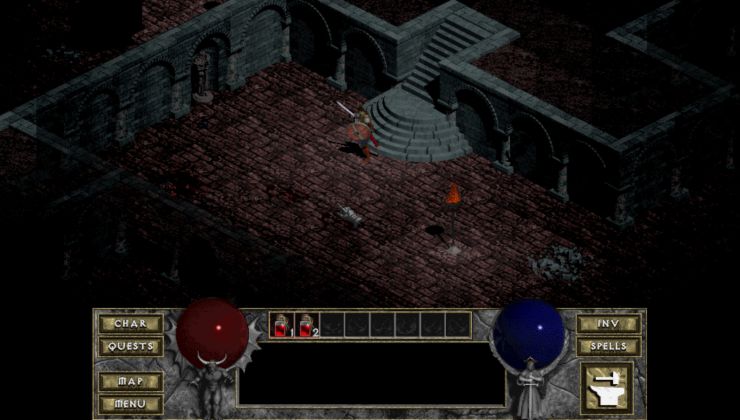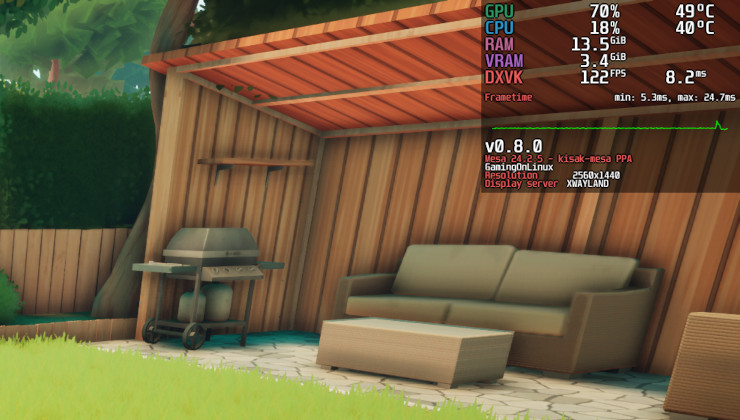By now you've probably heard either through us in our previous article or elsewhere that Valve are cooking something up to help Linux gaming even further. We have an idea on what one part of it is.
Valve already do quite a lot. There's the Steam Play Proton compatibility layer, the new container runtime feature to have Linux games both natively supported and Windows games in Proton run through a contained system to ensure compatibility, their work on Mesa drivers and much more.
In Valve's review of Steam in 2020 that we covered in the link above, one thing caught our eye and has been gaining attention. Valve mentioned for 2021 they will be "putting together new ways for prospective users to get into Linux gaming and experience these improvements" so what exactly does that mean? Well, a part of that might have already been suggested directly.
Back in November 2019, the open source consulting firm Collabora presented an overview of the work they have been doing funded by Valve. Towards the end of the talk they mentioned ongoing work towards foolproof and fast instant upgrades of Linux systems. Collabora mentioned it could work for specialised systems like consoles or other systems where you don't expect users to be highly technical. Leading into that, a Valve developer posted on Reddit to clarify more details around what Collabora were talking about:
The image-based updater work is part of a set of efforts to attempt to improve the experience of trying out Linux on a normal PC with live USB media, and instantly updating said media from the other OS without losing user data. There's no "locking down" involved, as it can easily be disabled by the user to fall back to the normal package manager.
Pierre-Loup Griffais, Valve
Linux has long been able to run directly from USB drives but what about the next stage of this evolution? That appears to be what Valve are hinting at in their 2020 review blog post.
Imagine if you will for a moment: a SteamOS-style USB stick, that's highly optimized for Linux gaming, with drivers ready to go and Steam pre-configured with everything it needs all direct from Valve and also this special update system to ensure it keeps on working. Now add in some pre-configured persistence so your games, files and so on stay on it and that sure sounds like a new way for users to get into and experience Linux gaming doesn't it? Steam Machines didn't work, so a way to properly experience Linux gaming in full on hardware people already own? That could certainly work.
That could be a much more interesting way to actually market and advertise Linux gaming too. It's not enough to have Linux distributions be fast and stable, and to have plenty of games available to play otherwise we would already be in a better position as a platform. An absolute game changer? No, but another very useful tool in the shed. The conversation changes with such an easy to use way to get involved. Burn it to a USB stick, load it on your PC and login to Steam, download a game and away you go — you're now gaming on Linux.
Not just for gamers though, this could be a pretty valuable tool for developers to test their games on Linux too. If it enables developers to quickly boot up a drive with Linux on, that's up to date and works with games, that's going to make things a lot easier in the long run from all sides.
USB drives have been ridiculously cost effective in the last few years too, along with plenty of USB3 options now existing for the speed and you can get quite a lot of storage on them so it would be a pretty fascinating move.
Over to you in the comments, what are your thoughts?
Of course! I'd never thought about the ramifications of those PC Bangs . . . that's probably one reason why China always seems to stampede towards a couple of really popular games: The cybercafes install the most popular games on all their computers, so when you go there that's all you're gonna play.
I suppose this could have some impact on that . . . if the owners are willing to sit still for people using the things.
The machines are going to be re-imaged regularly anyway, so that there aren't bitcoin miners and cheats and things left on their machines, so it's OK from a computer hygiene perspective, and a standard legit thing that lots of their customers might want to use is a more realistic prospect than the one Linux user in China coming in wanting to boot their own distro.
Unfortunately, as we see starkly when they double-count China in the hardware survey, most of those machines are running Intel/Nvidia. Pop gets round the issue by having an Nvidia image (that boots using the proprietary driver) and a non-Nvidia image (that doesn't). So, optimally for this use case, Valve would want to include both images and pick the one to use at boot time, with access to the library configured for both. Which is a pain, but doable.
1. Promoting Linux among Windows users to lure people away from Xbox Game Pass for PC, the biggest competitor for Steam. No Windows 10, no Game Pass.
2. Making Linux gaming a better experience for existing Steam for Linux users. That's obvious, just keep working on Proton, contributing to relevant software, making contact with AAA-developers so they make their games Proton compatible if not Linux native. Maybe they will finally make a 64-bit client. Maybe an ARM version.
3. Engaging in using Steam Linux users who don't use Steam. I don't think that anything could be done to "FOSS/DRM-free or bust" kind of people, but at least Steam could be pre-installed on all popular Linux distributions, like it already is on Manjaro. I heard China is about to switch to Linux (for real this time), and I'm pretty sure Valve will try to take an advantage of that.
What ideas I consider as bad:
1. Linux-exclusive games. Exclusivity is never good and, in this case, will result in material losses for Valve and just won't work.
2. Lesser percentage share that Valve would take for games with Linux versions. It contradicts the purpose of Proton and Steam. Also it could lead to shitty ports just to get quick money and then to disappointment in Linux for developers. Remember The Witcher 2?
3. Any hardware. It may sound promising in theory, but we all have already seen that in practise it never succeeds. Maybe years later, when ARM CPUs will replace current ones, and there will be powerful and cheap enough Nintendo Switch-like devices, then it's time to do something one more time. Have you seen GPD Win 3? It look awesome IMO, but with an Intel CPU it's too expensive and consumes too much power. There are similar projects, like AYA Neo, but all of them have these handicaps. Image a cheap handheld gaming device that is actually a PC with Linux and Steam.
4. That USB stick thing. Sorry, but it is just silly.
Well, only Gaben knows what the future holds.
This has been talked about across other articles, and noted in the first link in this article where Valve clarified what the work was for - to help DRM work in Proton.
Sorry I missed the link and articles, I wasn't paying much attention back in November.
1. Promoting Linux among Windows users to lure people away from Xbox Game Pass for PC, the biggest competitor for Steam. No Windows 10, no Game Pass.That's an interesting point.
I just don't see any other reason why would Valve prefer people to use Linux and not Windows 10 (if they even want that). Only to use their dominance on Linux. On Windows, there are Steam, Origin, EGS, etc. So many stores to choose where to spend money. On Linux, it's just Steam.1. Promoting Linux among Windows users to lure people away from Xbox Game Pass for PC, the biggest competitor for Steam. No Windows 10, no Game Pass.That's an interesting point.
In my opinion this solution also would be nice: USB stick with steamOS preinstalled on it.Connect it with PC and then use Valve's possible game streaming service(which consist of your games in personal library) without needing to install the desired game on a USB stick. But on the other hand it would need a good internet connection. But this is only a suggestion. What Liam(master) wrote about USB stick is also a good solution.To do this, they first need to run Steam Play 3.0 (Steam Cloud Play)
Automatic Proton Crash Reports
Simple concept, enhance Proton with the ability to automatically detect when it has crashed in a way that suggests a game attempted to do something which exceeds Proton's limitations in terms of what aspects of Windows it supports via compatibility layer, or detect crashes that are due to a bug in Proton itself, or due to crashes of the graphics driver, etc. Then report those to Valve's servers, along with useful contextual information, such as the user's distro, Linux kernel version, desktop environment, graphics card, CPU model, etc, to gather better information about crashes to identify bugs faster, to narrow down causes of bugs, and hence fix them more quickly.
Proton compatibility / debugging tools for Windows developers
Some developers may be keen to support Linux via Proton, for those developers, having some tools that let them run their Windows games on Linux and identify causes of Proton related bugs would be very helpful.
Incentivise Linux / Proton compatibility
Perhaps a lower store cut for games with Linux / Proton compatibility? This of course is dependent on just how badly Valve really wants Linux gaming to happen and how immediately. Perhaps they won't want it 'that much'.
Create a Proton-compatible EAC/BattlEye alternative
Why fix EAC/BattlEye, when they can just create something to replace it? Even better, make it open source too. And design it from the ground up to be compatible with Proton. Offer it for free to developers to use instead of EAC, and it would surely be popular if it offers comparable cheat protection.
Expand Proton Whitelist
Some games work very reliably via Proton on all hardware but aren't yet added to the Proton whitelist. It would be great to have the whitelist expanded to include them.
Automatic Per-Game Proton Tweaks
Some games are 'Platinum' with a single command line tweak. But to maximise the pleasantness of Proton's UX, ideally gamers should NEVER have to use a command line tweak, or consult a database to find tweaks to get games working. Everything should 'just work' as much as possible. It would be nice if Proton could automatically apply tweaks to certain games to get them working automatically, so they can be whitelisted.
Automated Proton Game-Like Test Suite on Test Machine Farm
Think of them as unit tests (if you're a developer you know what those are).
Basically a series of small applications developed on Windows, that test one specific thing. Such as:
- A feature of DirectX
- A specific method of a Windows API
- Functionality of a software library, like a physics engine, or audio library, etc
- Common method for achieving common gameplay functionality, such as common code patterns for switching between fullscreen/windowed/borderless
These tests would be all automated.
Even the ones that test user input APIs would do so in an automated way with the automation software faking user input to test it.
The testing system would test for accuracy, bugs, crashes, etc.
Ideally, these would be run on a dozen or so automated machines running varied configurations of Linux gaming setups, different hardware/distro/software setups.
The results of the testing would be a report of what tests failed and on which configurations. Identifying exactly what does or doesn't work in Proton and on what Linux gaming PC configurations.
This would make the task of identifying a problem and fixing it quick and easy. Rather than trying to manually test every game in existence and poke it's huge compiled binary source code to identify what exactly went wrong, these small tests could identify exactly what isn't working.
With enough tests for all the things found commonly in games, including regularly added new tests for new common libraries, APIs, etc, you could identify and fix problems well before they ever prevent games from running at release day.
Summary
More testing.
I think that's going to be the key to keeping progress on Proton moving forward at a rapid pace. Quickly narrowing down bugs and fixing them.
All problems become immediately harder to solve when finding the cause of the problem is like finding a needle in a haystack. Having better tools to discover causes of problems, will result in solutions arriving faster.
This is why I think the priority needs to be put on having ALL games at least playable on Linux first. This means working on the persisting Anti-Cheat issues as well as getting done further features that are currently not on-par with Windows performance like Raytracing.
In order to understand what Valve could intend, people should realize it's a commercial company that exists to make money, not to drive people to go FOSS. I don't believe that Valve advances Linux gaming just because good Gaben loves Linux and us, Linux users. Before suggesting an idea, try to think what benefit can Valve get and how. It should lead to a situation where more people spend more money on Steam.I agree with ageres and the other that expressed similar concepts before.
Supporting Linux is not the purpose of Valve, it is the mean that allows them not to be cut of from the market by the "walled garden" aspirations of Microsoft. Another goal for Valve may be to be able to keep selling classic old games that have problems running on the last Windows OS versions. I read some old games already run better under Proton than under Windows 10.
This USB bootable Steam drive looks like more a developer tool than a final user tool. I find it difficult to imagine a typical PC user go buy a (high performance) external drive and change the boot configuration of the PC to... what advantage? Run a game they already own with (usually) lower performance?
I think instead of an independent developer that is is evaluating the option to publish a game also on Linux but it knows nothing of this OS. If there was a cheap tool to be connected to their development PC that allowed them to test the game on Linux? Maybe with debug tools already loaded and configured to work with Proton and all the software and services that Valve offers. Maybe even with development environment already installed and configured with plugins, I think for example about Unity and all the games without a Linux version even if in theory it may be supported. No need to change their development environment after all the hours spend in configuring and adapting all the tools to their workflow. This will be an interesting new feature. It may even be useful to big companies for some initial evaluation to support Proton.
- It's not aimed at existing Linux users
- It's not the only thing they're doing, we're just explaining one possible thing based on what they said in the quote
- Valve and Wine can't solve EAC or BattlEye, it needs direct support from those vendors to make it happen to any degree of accuracy and to keep it working
- Some of you really lack imagination ;)
That's the massive challenge to overcome, and one that is no easy task.
Why should one try and see how well a game plays on Linux, when they know that best case scenario - BEST case scenario - is that it runs roughly equally to their Windows gaming rig. Most likely scenario is that it's playable, but with a performance penalty. And with likely challenges related to anti-cheat.
Why test Linux under those conditions? Like, at all?
Those who want to try gaming on Linux today are likely those who already know and use Linux at least partially. And those do extremely likely have at least a Linux PARTITION, if they're not 💯% Linux desktop users already.
let's face it: There are no non-ideologically motivated reasons to game on Linux today unless you're not already using Linux as your desktop OS. None.
Sure, a stray Windows gamer here and there, perhaps out of sheer curiosity, could possibly test this USB solution. But I sense that number to be neglectable in the bigger scheme of things.
And that leads me to wonder if in fact this technology isn't a part of something else, plans that's not as immediately easy to spot but could be of a more significant nature.
Last edited by Beamboom on 17 Jan 2021 at 4:20 pm UTC
Let's wait and see what's Valve's master plan (cloud gaming?) because I surely lack insight and imagination to figure it out. 😉
Personally I could imagine "Steam servers" with hot swappable drives(?), to stream to local thin clients, but I'm not sure what's the use case for that (cafés?)... I've never been to such places so there are others, here, who know better than me if it's a valid use case.
Last edited by Mohandevir on 17 Jan 2021 at 5:04 pm UTC
How did Steam get to where it is now? By exclusive games.
How did console X get to where it is now? By exclusive games.
The idea that user X is going to simply ditch his OS for no apparent reason is ridiculous to me.
Well, releasing exclusive games would be a much better option once they can point to an usb stick stick solution that doesn't alter the system, wouldn't it? This might be especially interesting if they plan to put pressure on apple.
Last edited by const on 17 Jan 2021 at 4:02 pm UTC
Someone's told, this USB stick should contains Steam Link OS. I think, Valve should create Steam Link for Android instead.I'm pretty sure this exists. Have it installed.
Someone's told, this USB stick should contains Steam Link OS. I think, Valve should create Steam Link for Android instead.I'm pretty sure this exists. Have it installed.
Yep! Using it on my Nvidia Shield and my other Android iptv box.
2) A way to play your own games in public computers, like cybercafes (yes, they are still popular in some places). They do have tools already for those, so this could be a very convenient tool.Many years ago, I think about opening one's company, which will translate OpenSource games to emscripten version and put it to one's web page with advertisement or paying services. I thought students will playing at lessons. Maybe that's the way?
3) Use it in thin clients, that play games through some kind of streaming (either in their servers, Stadia-like, or from your own gaming PC). Like an evolution of the current Steam Link, but with an entire OS attached?. Not sure why it would be a live OS though.I think Steam Link for Android could been better.
Last edited by Lachu on 17 Jan 2021 at 5:12 pm UTC
TGhere are plenty of USB distro's out there, Puppy is one, but one set up for gaming and game devs to use would be goodNot just for gamers though, this could be a pretty valuable tool for developers to test their games too.I think this is the real reason. I have seen a number of small devs post comments like "I don't have a linux machine" in answer to questions about porting games (or fixing the games they already ported). If it is super easy to plug in a USB drive and have an instant test environment, it would make many of those excuses go away.













 How to set, change and reset your SteamOS / Steam Deck desktop sudo password
How to set, change and reset your SteamOS / Steam Deck desktop sudo password How to set up Decky Loader on Steam Deck / SteamOS for easy plugins
How to set up Decky Loader on Steam Deck / SteamOS for easy plugins
See more from me